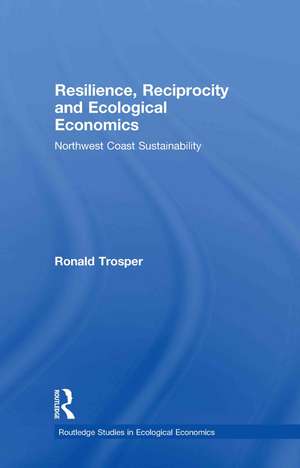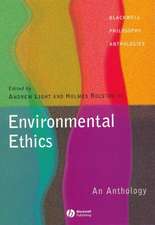Resilience, Reciprocity and Ecological Economics: Northwest Coast Sustainability: Routledge Studies in Ecological Economics
Autor Ronald Trosperen Limba Engleză Hardback – 2 feb 2009
The answer to the first question involves identification of the key institutions that characterized those societies. It also involves explaining why these institutions, through their interactions with each other and with the non-human components, provided both sustainability and its necessary corollary, resilience.
Answering the second question involves investigating ways in which key features of today’s social ecological systems can be changed to move toward sustainability, using some of the rules that proved successful on the Northwest Coast of North America.
Ronald L. Trosper shows how human systems connect environmental ethics and sustainable ecological practices through institutions.
| Toate formatele și edițiile | Preț | Express |
|---|---|---|
| Paperback (1) | 320.78 lei 6-8 săpt. | |
| Taylor & Francis – 10 mar 2011 | 320.78 lei 6-8 săpt. | |
| Hardback (1) | 816.73 lei 6-8 săpt. | |
| Taylor & Francis – 2 feb 2009 | 816.73 lei 6-8 săpt. |
Din seria Routledge Studies in Ecological Economics
-
 Preț: 258.48 lei
Preț: 258.48 lei - 26%
 Preț: 762.41 lei
Preț: 762.41 lei - 26%
 Preț: 814.38 lei
Preț: 814.38 lei - 13%
 Preț: 288.81 lei
Preț: 288.81 lei - 23%
 Preț: 319.37 lei
Preț: 319.37 lei - 26%
 Preț: 847.09 lei
Preț: 847.09 lei - 13%
 Preț: 296.09 lei
Preț: 296.09 lei - 26%
 Preț: 844.87 lei
Preț: 844.87 lei - 23%
 Preț: 321.88 lei
Preț: 321.88 lei - 13%
 Preț: 295.47 lei
Preț: 295.47 lei - 14%
 Preț: 293.38 lei
Preț: 293.38 lei - 23%
 Preț: 320.95 lei
Preț: 320.95 lei - 26%
 Preț: 981.53 lei
Preț: 981.53 lei - 13%
 Preț: 295.47 lei
Preț: 295.47 lei - 12%
 Preț: 300.17 lei
Preț: 300.17 lei - 13%
 Preț: 339.70 lei
Preț: 339.70 lei - 11%
 Preț: 335.07 lei
Preț: 335.07 lei - 23%
 Preț: 326.34 lei
Preț: 326.34 lei - 26%
 Preț: 844.76 lei
Preț: 844.76 lei - 26%
 Preț: 817.82 lei
Preț: 817.82 lei - 23%
 Preț: 320.78 lei
Preț: 320.78 lei - 12%
 Preț: 304.21 lei
Preț: 304.21 lei - 26%
 Preț: 816.73 lei
Preț: 816.73 lei - 13%
 Preț: 294.98 lei
Preț: 294.98 lei - 26%
 Preț: 849.58 lei
Preț: 849.58 lei - 17%
 Preț: 246.71 lei
Preț: 246.71 lei - 26%
 Preț: 816.73 lei
Preț: 816.73 lei - 26%
 Preț: 818.71 lei
Preț: 818.71 lei - 23%
 Preț: 323.57 lei
Preț: 323.57 lei - 26%
 Preț: 820.05 lei
Preț: 820.05 lei - 13%
 Preț: 296.29 lei
Preț: 296.29 lei - 26%
 Preț: 872.94 lei
Preț: 872.94 lei - 23%
 Preț: 325.08 lei
Preț: 325.08 lei - 26%
 Preț: 817.27 lei
Preț: 817.27 lei - 26%
 Preț: 842.43 lei
Preț: 842.43 lei - 26%
 Preț: 847.09 lei
Preț: 847.09 lei - 26%
 Preț: 817.82 lei
Preț: 817.82 lei
Preț: 816.73 lei
Preț vechi: 1103.67 lei
-26% Nou
Puncte Express: 1225
Preț estimativ în valută:
156.29€ • 164.38$ • 130.59£
156.29€ • 164.38$ • 130.59£
Carte tipărită la comandă
Livrare economică 08-22 ianuarie 25
Preluare comenzi: 021 569.72.76
Specificații
ISBN-13: 9780415419819
ISBN-10: 0415419816
Pagini: 202
Ilustrații: 8 tables
Dimensiuni: 156 x 234 x 13 mm
Greutate: 0.54 kg
Ediția:New.
Editura: Taylor & Francis
Colecția Routledge
Seria Routledge Studies in Ecological Economics
Locul publicării:Oxford, United Kingdom
ISBN-10: 0415419816
Pagini: 202
Ilustrații: 8 tables
Dimensiuni: 156 x 234 x 13 mm
Greutate: 0.54 kg
Ediția:New.
Editura: Taylor & Francis
Colecția Routledge
Seria Routledge Studies in Ecological Economics
Locul publicării:Oxford, United Kingdom
Public țintă
PostgraduateCuprins
1. Sustainability Needs Tested Ideas from the Pacific Northwest, 2. Why it is So Difficult to Learn from Aboriginal North America, 3. A Partial Policy Framework Already Exists, 4. Gifts: Indian Giving Creates Consumption Connections to Mirror Ecosystem Connections 5. Chiefs: Empower Generous Facilitators to Resolve Conflicts, 6. Contingency: Community limits on Individual Behavior Promote Resilience, 7. Comparison of indigenous and industrial salmon management, 8. Relicensing of Kerr Dam on the Flathead Indian Reservation, 9: Nisga’a Nation and Treaty, 10: Dams and Salmon on the Lower Snake River, 11. The NW System Encourages Adaptive Management
Recenzii
"This anthropological and sociological study sets out to show how human systems connect environmental ethics and sustainable ecological practices through institutions. Based on the case of the Northwest Coast of America, the author asks, firstly, how one group of indigenous societies managed to live sustainably with their ecosystems for over 2,000 years, and secondly, whether the answer to this question can inform the current debate about sustainability in today’s social ecological systems." - Journal of Consumer Policy
Descriere
This book explores one indigenous society and how they managed to live sustainably with their ecosystems for over two thousand years, showing how human systems connect environmental ethics and sustainable ecological practices through institutions.























